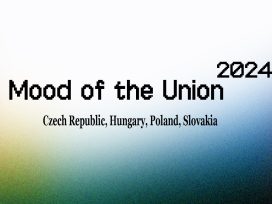A society, like a man at times, must hit rock bottom before it can rebound. Whether or not the assassination of a young journalist – in this case actually a student – will shatter our society in a positive way depends on us Slovaks. We are entering one of the ‘-8’ years, which in the past have marked our greatest disgrace, in 1948 or 1968, but also the glory of 1918, when democratic Czechoslovakia was founded – and our annus mirabilis, 1998, when we were able to face down a potential dictator. The year 2018 has now come around and the state of our political scene does not indicate that Slovak society has the energy to change much. To paraphrase Czech writer Ludvík Vaculík, we may ask whether it is worse or better than in the nineties. It’s worse, but ‘we wallow in it with great pleasure.’
Let’s not be fooled by our politicians. The opposition parties in Slovakia are demoralized, fractured, and do not offer real change, just an alternative power structure. That is not enough. The current government of Robert Fico, reflecting its crass decade-long habits, throws a million euros in cash on a table – in fact, taxpayers’ money – for relevant information, as ostentatious proof of its determination to catch the killer. More symbolic would have been two piles of 500-euro bills, the mafia’s preferred banknote. If the murderers are found, the tip-off will certainly not come from an innocent neighbour or a learned criminal psychologist, but from a ‘wise guy’, a fellow thug, who moves in the environment where murders are planned and ordered.
Even if they catch the murderers of these two innocent people, even if those who ordered the killing are arrested and a few government officials are dismissed, it will still not cleanse society itself. Since 1989 in Slovakia, not a single case of corruption connected to political power has ended in a successful conviction. We have become a place where justice evaporates, and we feel helpless, as when we watch the huge number of lumber trucks that are now stripping our forests. It’s evidently unjust and disgraceful, yet legally sanctioned or, simply, ignored. We are enraged, while also apathetic because we are losing hope that Slovakia can change.
The current prime minister, interior minister and police chief are not directly responsible for the murder of Ján Kuciak and Martina Kušnírová. They are, however, responsible for the environment in which political corruption blossoms. And naturally it spreads with no one to stop it. It seems that the best path for an embezzler or a hoodlum to thrive is to enter the structures of a governing party. Ján Kuciak most likely died because he revealed thieves and their connection to politicians. His murder is intended to intimidate journalists, but also anyone who asks for political corruption to be punished.
Putting the killer behind bars will be scant consolation if we do not have bold and honest police officers, prosecutors and judges, and the kind of politicians whose actions are not driven by their egos, but are determined by the rule of law. In 2018, we are all in debt for the freedom we have now enjoyed for 29 years, but at the same time we have to defend and protect this freedom anew. No political and social reform will bring back Ján and Martina. Yet, if they had lived, they would certainly want to live in a country where investigative journalists, along with those in power, cultivate and embody what in developed societies is called justice.
A Slovak version of this article was published in the SME daily on 1 March 2018.







